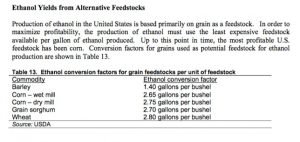Flexing to ‘green’ industries
I grew up in the world of Carla Rising, where the industrial subsidiaries of US Steel, FMC, Monsanto, Carbide, and Dupont historically pulled coal from the ground and fossil-fuels from the earth to produce electric power and petro-chemicals.
In the current global post-industrial age, however, even the biggest corporations are finding ways to manufacture household goods more sustainably — using renewable, often agricultural materials and new processes that emit minimal amounts of CO2 and other greenhouse gases.
Bioethanol and bio-plastics are sustainable products of post-industrial manufacturing using renewable resources. Brazil’s auto industry, for example, makes cars that can burn E85, 85% ethanol — a fuel made from Brazilian cane sugar. In the United States, ethanol is largely made from heavily subsidized corn , but it has also been made from excess sugar, as in Brazil and elsewhere.
, but it has also been made from excess sugar, as in Brazil and elsewhere.
Unfortunately, US biofuels production is hindered, in part, by the historically dominant fossil-fuels market. The low price of fossil oil and gasoline and a lack of environmental regulation continues to favor the use of fossil fuels, however unsustainable.
At the same time, green manufacturers are mobilizing — eager to respond, for example, to a decades-long plastics-and-packaging environmental crisis.
Today’s cutting-edge sustainable manufacturing technology is being built into new factories around the world. All over the globe, biofuels and bioplastics are being produced from forest byproducts, corn, sugarbeet, wheat, and even hemp. One plant, in Germany, buys locally produced wheat to produce sugar, ethanol, bio-gas, animal feed, liquified food-grade CO2, AND cogenerated energy.
It isn’t much of a leap to imagine the former chemical plants of my region — refitted from fossil feedstocks to locally sourced renewables to make and use bioethenol to produce farenesene and bio-plastics instead of PET plastics. Happily, there is no lack of good minds empowered to design such manufacturing technologies.
A little more slowly, good politicians of the present and future are seeing ways to support new, cleaner industries, and build the sustainable bio-fuels and bio-plastics factories of the future.
